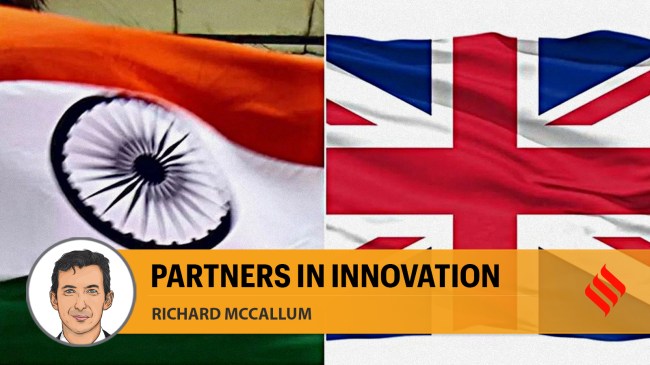Opinion How UK and India can collaborate for a Viksit Bharat
We can definitely do more to plug Indian companies into UK supply chains. Our message to UK business is clear — consider India a strategic partner, not just a market
 Technology is a thread that runs through every sector in the UK-India economic partnership.(Express Archives)
Technology is a thread that runs through every sector in the UK-India economic partnership.(Express Archives) In the UK, when I take a long-haul flight, drive a car that has connected technology or use an online banking app, it’s likely that in some way, I’m tapping into technology that has been developed in a global capability centre (GCC) in India. However, few UK consumers appreciate how technology collaboration between foreign firms, including those in the UK, and India’s dynamic scientific talent and innovation ecosystem, impacts their lives. Or saves lives, as we saw with vaccine development during the pandemic.
Technology is a thread that runs through every sector in the UK-India economic partnership. I want to make the case that the UK and India are partners not just in technology but for Viksit Bharat 2047.
In 2024, the UK was third behind the USA and China in attracting venture-capital investment into its technology companies. London alone has more technology start-ups than the rest of Europe combined. At the same time, India has become a technology superpower. So much can be achieved when businesses and universities in the two countries collaborate. This is why the organisation I lead, the UK India Business Council (UKIBC) welcomed the recent signing of the UK-India Technology Security Initiative, a bilateral agreement to increase collaboration on emerging and critical technologies. There are already many examples of such collaboration — the UKIBC recently published a report capturing examples and suggesting ways to enable more.
In financial services, British banks are among the leading investors in India and are already deploying tech-led solutions across segments. By sharing regulatory best practices and standards, India can attract more UK fintech companies, thereby enhancing SME lending and financial inclusion.
As a leader in green innovation and regulation, the UK can become India’s energy transition partner, providing green technology solutions and access to finance through the City of London. The climate crisis doesn’t respect borders, and UK and Indian universities can be a force for global good. Take the Sunrise project — a multinational collaboration led by Swansea University with 18 academic partners across five countries, including Imperial College London, Oxford, Cambridge, IISER Pune, IISc, and several IITs. We argue that India can boost market access for British businesses through sustained government platforms that spark partnerships with Indian industry. India can also expand priority-sector lending to include EVs and EV-supporting infrastructure alongside renewable energy to help reach its goals.
Advanced manufacturing and defence is another area where UK and Indian firms are co-developing technology. Few markets have India’s scale or need for new capability, but at the same time, UK firms can benefit from India’s cost-effective manufacturing. We can do more to plug Indian companies into UK supply chains. Our message to UK business is clear — consider India a strategic partner, not just a market.
The UKIBC aerospace and defence group, representing 22 UK firms with $60 billion in global revenue, is eager to expand partnerships with India. It believes technology infusion and investment into India can speed up with certain refinements to India’s defence acquisition procedure — for example, adopting a more graduated approach to indigenous content to encourage foreign firms into the market, and relooking at FDI thresholds so that more foreign firms can participate in strategic defence programmes. We also argue that the UK can do more to help its start-ups dock into India’s defence technology start-up scene. For example, an accelerator programme for high-growth UK firms to enter India.
Clearly, the economic relationship is strong and growing. We can be more imaginative in our ambition. At our recent Technology Futures Conference, Minister of Commerce and Industry Piyush Goyal spoke about how the UK and India could collaborate on AI and virtual reality to transform education and training. And how a tele-medicine partnership could bring down the cost of healthcare in the UK and make quality healthcare available to the remotest parts of India. He also suggested that the two countries work to develop climate modelling tools to predict and manage natural disasters. These are excellent ideas that need capital. Recently, I’ve been imagining a big, bold G2G-backed investment fund to support collaboration between UK and Indian start-ups in emerging technologies.
Ideas also need skilled people to make them happen. I’ve been imagining a time when we talk about tens of thousands of British students in India — taking advantage of economical courses in AI upskilling and understanding the business culture of the next superpower. I started with GCCs and I’ll finish with them. 2024 was a good year for the UK-India relationship. 2025 will be better, as UK business leaders realise that engineering and research centres in India aren’t just for big brands; with new operating models, even mid-size and smaller firms can tap into the Indian GCC phenomenon. Let’s be imaginative and relentless in pursuing the extraordinary potential of this relationship.
The writer is CEO, UK India Business Council






